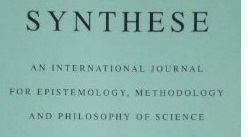The normativity of Lewis conventions
Synthese, online first (doi:10.1007/s11229-012-0131-x) - 2012
 David Lewis famously proposed to model conventions as solutions to coordination games, where equilibrium selection is driven by precedence, or the history of play. A characteristic feature of Lewis Conventions is that they are intrinsically nonnormative. Some philosophers have argued that for this reason they miss a crucial aspect of our folk notion of convention. It is doubtful however that Lewis was merely analysing a folk concept. I illustrate how his theory can (and must) be assessed using empirical data, and argue that it does indeed miss some important aspects of real-world conventions.
David Lewis famously proposed to model conventions as solutions to coordination games, where equilibrium selection is driven by precedence, or the history of play. A characteristic feature of Lewis Conventions is that they are intrinsically nonnormative. Some philosophers have argued that for this reason they miss a crucial aspect of our folk notion of convention. It is doubtful however that Lewis was merely analysing a folk concept. I illustrate how his theory can (and must) be assessed using empirical data, and argue that it does indeed miss some important aspects of real-world conventions.
Download articolo completo:


